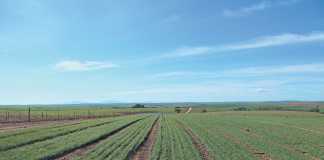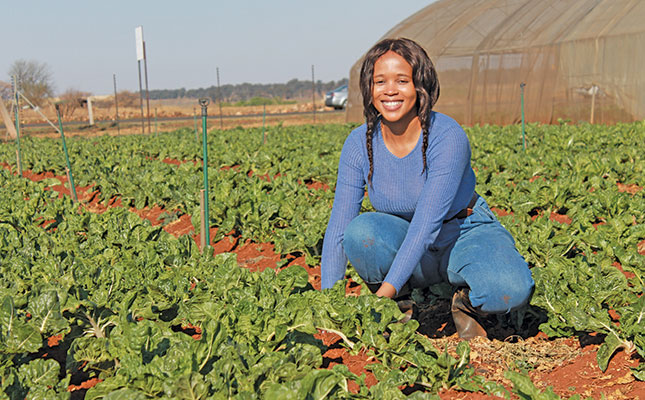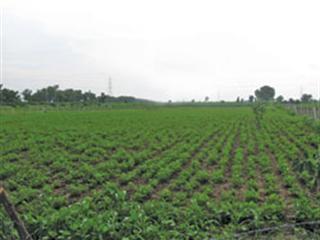
Farming provides more than 80% of employment and 57% of gross national income in Kenya, as well as a quarter of the country’s gross domestic product (GDP). In recent years, in a wave of co-ordinated support, both the government and private business have increased their commitment to the sector, which has now overtaken real estate and the stock market in returns.
Small-scale farmers have also benefited from the government-owned Kenya Agricultural Research Institute (KARI). Set up in 1979 to research better agricultural techniques, the institute has developed more than 2 000 high-yielding, drought- and disease-resistant crop varieties over the years. Due to lack of communication, however, KARI has always been far removed from farmers in the field.
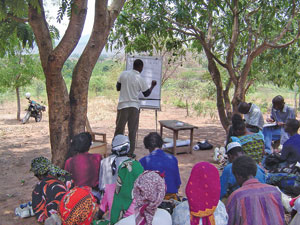
Small-scale farmers from the Mbari ya Mboche farmers group’ in Central Kenya attend a field school. This system is more effective than using extension officers, as teachers and trainees already know and trust each other. Courtesy of FarmBizAfrica
It has, for example, struggled to get airtime on Kenyan radio channels to educate farmers about the seeds and correct farming techniques. The media, according to Mwikali Leah, senior programme officer at KARI, is more interested in politics and fails to understand how important the seeds are to farmers.
Agricultural training on the ground has also lacked effectiveness. Although the government has long employed extension officers, there have never been enough: the ratio is one to 1 200 smallholders. Now a breakthrough has come with an innovative concept: ‘farmers’ field schools’, which train farmers using one farmer’s land as a demonstration plot.
Intensive training
The model, which is supported by the government and non-profit organisations, provides intensive training to a small group of farmers, who then mentor other farmers. The system is more effective than using extension officers, because the trained farmers usually know the trainees personally, says Flavian Kiige, a trainer for Bridgenet Africa, a non-governmental organisation that has run more than 350 field schools in Kenya.
The schools have also spawned their own farmers’ groups, many of which have approached buyers who are seeking steady supplies of produce. “A single farmer cannot guarantee a large, consistent supply of produce, so he or she is unable to get a large-scale buyer to sign a contract,” explains Jeremy Kosgey, chairperson of Kopterir farmers’ group in Kenya’s Rift Valley province. “This gave us the idea of forming farmers’ groups so we could sell in bulk. It has really paid off.” Kosgey’s group supplies potatoes and bananas to big crisp processors.
Multinationals
The field schools have also caught the attention of multinational companies keen on cutting their reliance on imports. Coca-Cola, for example, is buying fruit such as mango and passion fruit from farmers to supply the increasing demand for fresh fruit juice. And Olivado Kenya, a New Zealand company, has contracts with farmers to supply avocados for processing into oil.
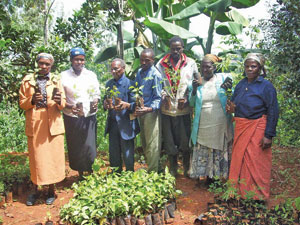
Small-scale farmers at a tree-planting lesson. Courtesy of FarmBizAfrica
Seed companies, too, are contracting farmers to grow seed on their behalf, and buying the seed from them at double the price the farmers previously obtained in street markets. “Seed companies in Kenya have contracted about 10 500 farmers since 2010. This figure is projected to climb to 50 000 seed growers in 2015,” says Douglas Tere, an extension officer with the ministry of agriculture.
The success of these farmers has attracted the interest of insurance companies, several of which have introduced schemes targeted at small-scale farmers. With a premium based on the location of the farmer and the crop or livestock kept, farmers are assured of compensation. The involvement of insurance companies is part of a growing momentum in East Africa to grant small-scale farmers access to financial services and credit facilities.
Five states, including Kenya, have formed a network of insurance firms, banks, venture capitalists, private equity funds, government regulators and regional economic communities to increase funding to the sector. The grouping, funded by USAID, is known as the East Africa Agriculture Network.
Exports
A major focus in coming years will be upgrading farm management to meet strict European export requirements. Since the 1990s, European supermarket chains and their major suppliers have set a common standard for farm management practices – the so-called EurepGAP (Euro-retailer good agricultural practices). This has locked out many Kenyan small-scale farmers as they find it difficult to adhere to the requirements. But the situation is changing.
Alex Waiganjo, a secretary at the Kenyan ministry of agriculture, says: “We’re making progress. Hundreds of farmers are now including the requirement in their field schools, and we’re looking for our farmers to take a bigger market share in Europe.”
Weather studies
In the meantime, research at KARI continues, with an emphasis on changing weather patterns that have disrupted planting seasons and affected high performing crops such as bananas and cassava. These are now the focus of research aimed at securing better yields at higher temperatures and with erratic rainfall.
How the banks are helping
Financing for farmers in Kenya has undergone a quiet revolution. Traditionally, individual farmers have been unable to access funds and credit facilities to buy farming inputs and fertiliser, and have had to resort to informal, ‘stokvel’-styled investment groups that pooled resources. However, the growing number of successful small-scale farmers in the past two years has encouraged virtually all of Kenya’s commercial banks to rethink their strategies, and many now include financial packages specifically aimed at these producers.
Big banks in the country, including Equity Bank, Commercial Bank and National Bank, now offer asset financing for farmers, enabling them to achieve their objectives along the entire value chain – from production and processing to marketing. Kilimo Biashara, which means ‘safe farming’, is one such initiative, and has achieved remarkable success.
A loan project developed in 2008 between Equity Bank, Kenya’s largest bank, and the Alliance for a Green Revolution in Africa (AGRA), a non-profit organisation, it has financed no fewer than a million farmers. In addition, it has opened marketing doors for these producers by connecting them with traders.
Contact Bob Koigi on +254 72 695 6585.











